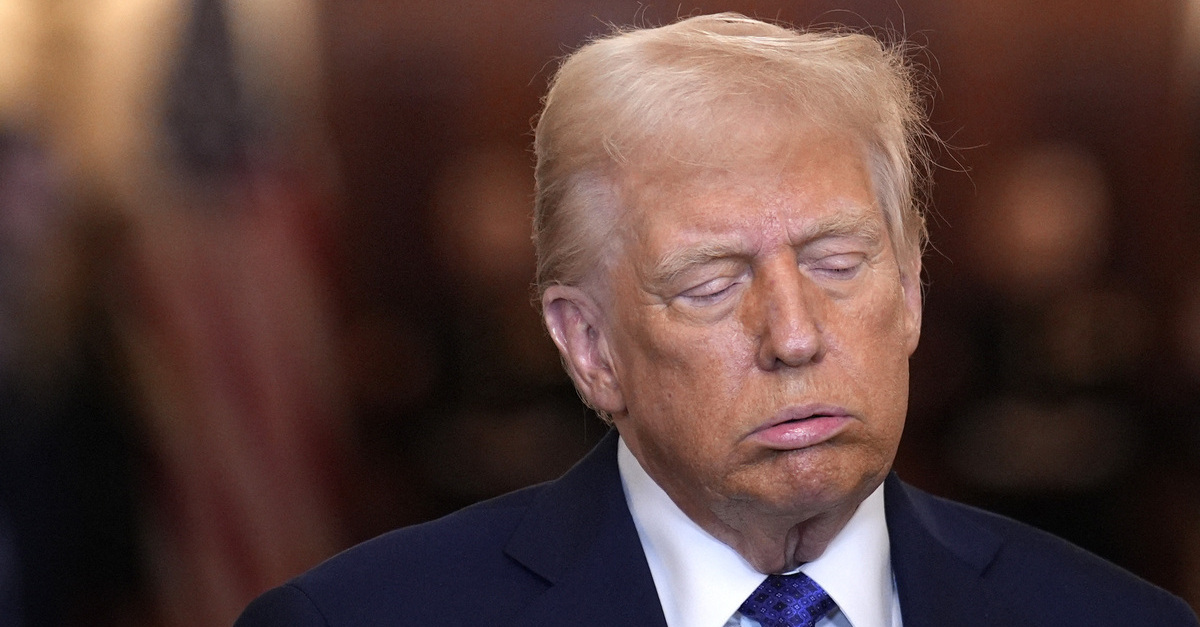
US President Donald Trump arrives before signing the Laken Riley Act into law in the East Room at the White House in Washington on January 29, 2025 (Yuri Gripas/Abaca/Sipa USA/Sipa via AP Images).
A federal judge has stopped an effort by the Trump administration to transfer three transgender women to an all-male prison.
On Tuesday night, Ronald Reagan-appointed U.S. District Judge Royce C. Lamberth, sitting in Washington, D.C., issued a temporary restraining order in favor of the Doe inmates who sued the government on Jan. 30.
The court found that plans to transfer the inmates and bar them from accessing medical care for their gender dysphoria amount to cruel and unusual punishment prohibited by the Eighth Amendment.
In the ruling, the judge determined the plaintiffs were likely to succeed on the merits of the claim as their case progresses, that they are likely to suffer a significant degree of harm without the order, that on balance their position is stronger than the government’s, and that the public interest favors maintaining the status quo for now.
The litigation is in response to a Jan. 20, executive order signed by President Donald Trump which purports to defend women from “gender ideology extremism” and restore “biological truth” by, among other things, transferring transgender women to men’s lockups and by barring inmates from accessing medical care for gender dysphoria.
In the order, the judge details the relevant guidance from Trump to Bureau of Prisons (BOP) officials — and finds that the mandatory nature of this guidance helps the plaintiffs prove their case.
“[T]he plaintiffs claim that their imminent transfer to a male penitentiary and deprival of their hormone therapy would inherently work an Eighth Amendment injury,” the judge writes. “The text of the Executive Order plainly requires the BOP to perform the allegedly unlawful facility transfer and to withhold the prescribed hormone therapy drugs. Thus, there is no form of relief that is within the BOP’s discretion to provide and that would remedy the plaintiffs’ supposed constitutional violations.”
That state of affairs, however, only gets the plaintiffs within the purview of the court because there is no other cognizable recourse through the federal prison system, the judge explains.
On the merits, the court find that the inmates showed an objective potential harm from the policy, as well as a subjective knowledge on behalf of federal officials that such harm might occur.
“With respect to the transfer provision, the plaintiffs cited to various government reports and regulations recognizing that transgender persons are at a significantly elevated risk of physical and sexual violence relative to other inmates when housed in a facility corresponding to their biological sex — which the defendants do not dispute,” Lamberth explains. “The plaintiffs further claim that placement in a male penitentiary by itself will exacerbate the symptoms of their gender dysphoria, even if they are not subject to physical or sexual violence in their new facility — whether because they will be subject to searches by male correctional officers, made to shower in the company of men, referred to as men, forced to dress as men, or simply because the mere homogenous presence of men will cause uncomfortable dissonance.”
The inmates also provided testimony from a physician cataloging “numerous and severe symptoms” that could occur if their access to gender-affirming medication is cut off by the BOP. And, the judge notes, the government did not bother to contest these arguments.
In fact, the government largely tried to argue its case procedurally, based on jurisdiction — but those efforts fell fully flat.
“Nor do the defendants dispute the plaintiffs’ allegations that the BOP is subjectively aware that transferring the plaintiffs to a male penitentiary would substantially increase the likelihood of them experiencing this parade of harms; indeed, the government resources and regulations to which the plaintiffs gesture in their complaint strongly suggest the requisite awareness on the part of the BOP,” Lamberth continues.
Instead, the judge notes, Trump administration lawyers effectively shot themselves in the foot with their own arguments.
As Law&Crime previously reported, the government noted that only 16 male-to-female transgender woman currently reside in women’s lockup facilities — and that 1,490 reside in men’s facilities. To hear the U.S. Department of Justice tell it, these numbers precluded the notion that transferring the minority of such inmates to men’s facilities could be considered cruel and unusual punishment.
Rather, the judge said, this admission helped the plaintiffs’ case.
“[B]y the defendants’ own admission, there are only about sixteen male-to-female transgender women housed in female penitentiaries, including the plaintiffs,” the judge’s order goes on. “And the defendants have not so much as alleged that the plaintiffs in this particular suit present any threat to the female inmates housed with them, or that this threat cannot be managed locally by prison staff. Thus, the public interest in seeing the plaintiffs relocated immediately to male facilities is slight at best. And it is hard to cognize of any public interest in the immediate cessation of their hormone therapy.”
A hearing on the matter was held earlier on Tuesday. By 7 p.m. that same day, the judge had issued the order on behalf of the plaintiffs.
The inmates’ original request also contained arguments focused on equal protection and Administrative Procedure Act claims. But the Eighth Amendment claims were enough to pause the government’s plans here, the judge opined, so their other arguments were not considered for purposes of the temporary restraining order.
Lamberth’s temporary restraining order is the latest setback for the Trump administration’s anti-transgender policies.
Last week, another pseudonymous transgender woman inmate won a similar temporary restraining order in a Massachusetts court.
Earlier this week, a group of named transgender service members moved for a restraining order against the Trump administration’s ban on military service. That request is currently pending.







